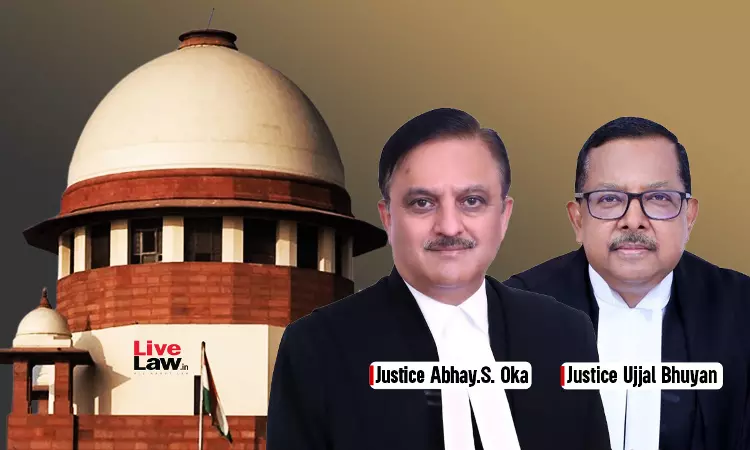- Home
- /
- Supreme court
- /
- Citizens Who Approach Police...
Citizens Who Approach Police Station To Report Crime Entitled To Be Treated With Dignity : Supreme Court
Amisha Shrivastava
30 April 2025 1:17 PM IST
The Supreme Court has observed that every person who approaches a police station to report the commission of an offence is entitled to be treated with dignity. "That is his fundamental right under Article 21 of the Constitution of India," the Court stated.A bench of Justice Abhay S. Oka and Justice Ujjal Bhuyan made the observation while upholding an order of the Tamil Nadu State Human...
The Supreme Court has observed that every person who approaches a police station to report the commission of an offence is entitled to be treated with dignity. "That is his fundamental right under Article 21 of the Constitution of India," the Court stated.
A bench of Justice Abhay S. Oka and Justice Ujjal Bhuyan made the observation while upholding an order of the Tamil Nadu State Human Rights Commission (SHRC) imposing a cost of ₹2 lakh on the state government, to be recovered from the police inspector who had refused to register a First Information Report (FIR) and misbehaved with individuals who had approached the station to lodge a complaint regarding alleged cheating and embezzlement amounting to ₹13 lakh.
"Every citizen of India who goes to the police station to report commission of an offence deserves to be treated with dignity. That is his fundamental right under Article 21 of the Constitution of India," the Court observed.
The complainant, along with his parents, visited the Srivilliputhur police station to file the complaint. The complaint was handed over to the sub-inspector, who stated that since the transaction was done in three different locations, he could not accept the complaint without the inspector's approval. The sub-inspector provided the phone number of the police inspector, i.e, the petitioner, and later the complainant's mother spoke to him over call.
The complainant later visited the police station again at 5:00 PM and was told to wait for the arrival of the police inspector, who eventually arrived at 8:30 PM. The inspector (petitioner) refused to register an FIR and used objectionable language with the respondent's mother.
By the impugned order, the SHRC directed the Additional Chief Secretary of the Government of Tamil Nadu, Home Department, to pay compensation of Rs. 2,00,000 to the complainant. It granted liberty to the Additional Chief Secretary to recover the said amount from the petitioner, who was the inspector of police at Srivilliputhur police station.
The petitioner, Pavul Yesu Dhasan, filed the present plea challenging the SHRC order as well ad Madras High Court order that upheld the SHRC order.
SHRC, after holding an inquiry, found that the petitioner not only refused to register the FIR but also used filthy language while speaking to the respondent's mother.
The Supreme Court noted, “Very objectionable language was used by the petitioner to talk to the respondent's mother, which is noted in paragraph number four of the impugned judgment of the State Human Rights Commission.”
The petitioner's counsel argued that even assuming that the inspector declined to register the FIR, it would not amount to a violation of human rights.
Section 2(1)(d) of the Human Rights Act defines human rights as “the rights relating to life, liberty, equality and dignity of the individual guaranteed by the Constitution or embodied in the International Covenants and enforceable by Courts in India.”
Rejecting the petitioner's submission, the Court said, “The facts of this case, to say the least, are shocking…All that respondent wanted is registration of First Information Report. The law is well settled. The sub inspector did not register the First Information Report. Petitioner being senior officer ought to have immediately registered the First Information Report. However, not only he refused to do it but used very objectionable language while talking to the respondent's mother.”
Finding no error in the Commission's and the High Court's conclusions, the Court dismissed the plea. “Therefore, looking into the conduct of the petitioner, it was rightly found by the Commission and by the High Court that there was violation of human Rights on the part of the petitioner. Therefore, no interference is called for. Petition is dismissed.”
Case: PAVUL YESU DHASAN Vs THE REGISTRAR STATE HUMAN RIGHTS COMMISSION OF TAMIL NADU |SLP(C) No. 20028/2022 Diary No. 33406 / 2022
Citation : 2025 LiveLaw (SC) 562



